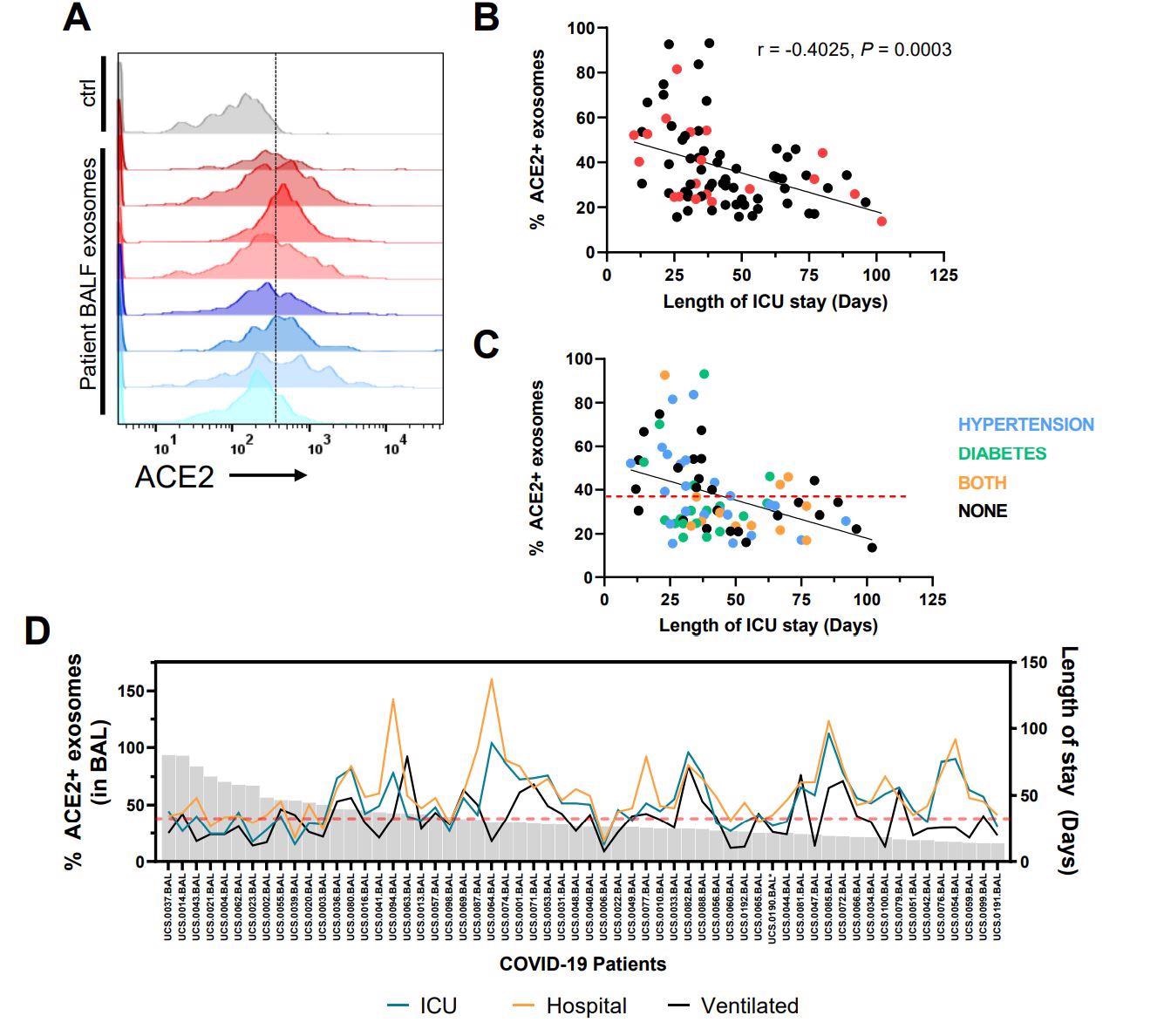Part of the reason that coronavirus disease 2019 (COVID-19) was so worrying when it first spread around the world was the lack of specific therapies to treat the disease. Healthcare workers were forced to treat the symptoms using supplementary oxygen or invasive mechanical ventilation. Researchers from New York University have been examining the ability of defensosomes to combat severe acute respiratory syndrome coronavirus 2 (SARS-CoV-2) infection.
A preprint of the group's study can be found on the bioRxiv* server.

ACE2+ exosomes are associated with reduced length of stay in ICU for COVID-19 patients.
The Study
The researchers analyzed bronchioalveolar lavage fluid (BALF) samples from 80 patients showing severe COVID-19 symptoms. 76.2% of these were male, roughly half were white, and they had a mean age of 62 years. 52.5% of patients showed hypertension, and 38.3% had diabetes. All of these patients were in intensive care and required mechanical ventilation due to respiratory failure. Biochemical fractionation was then used to enrich these samples for exosomes followed by flow cytometry.
After applying gating criteria for exosomes, the mean fluorescence intensity (MFI) was used to detect significant interindividual variation in the proportion of exosomes with surface ACE2 and the levels of ACE2 on each exosome. 10 patients were found to have at least two-fold higher exosome levels in their BALF compared to mean exosome levels from other patients.
Following this, they examined whether the level of ACE2 on exosomes, or the proportion of ACE2+ exosomes, correlate with parameters including age, sex, disease severity, and comorbidities. They ran regressions using ACE2 MFI as a predictor of ICU stay outcome as a sensitivity analysis, revealing the same trends in covariates as previously seen.
When compiling the information about the proportions of ACE2 containing exosomes in patient BALF, different models were run using clinical data to test the associations with ACE2 exosomes and length of stay in the ICU. These models included a linear model and a negative binomial model controlled for age, gender, culture results of BAL and blood, and comorbidities. A sensitivity analysis model was included using an interaction term between gender, sex, and hypertension as these are normally correlated.
The coefficients were expressed without interaction as estimates did not change significantly. Both the linear and negative binomial models revealed a negative correlation between length of stay in the ICU and proportion of ACE2 exosomes in the BALF. To confirm these results and remove complications that could arise from other issues, these models were run again using ventilation days as an outcome – to the same result.
They found that patients with a proportion of ACE2 exosomes below the mean of 38.78% generally have longer stays in both the ICU ward and in hospital as well as increased days spent on a ventilator. Diabetes was found to decrease the proportion of ACE2 exosomes, and the authors suggest that this could be the mechanism behind other comorbidities as well. Hypertension was also found to lead to reduced levels of circulating ACE2, resulting in increased concentrations of Angiotensin II, a vasoconstricting molecule.
The scientists then examined whether immune ligands generated during RNA virus infections affect endosome mutations by stimulating A549 cells with oxidized mitochondrial DNA (ox-mtDNA) – known to be produced during respiratory tract infections. This did increase exosome production, but the same was not seen with sheared genomic DNA or DNA fragments without oxidized bases. CpG-B was also tested and failed to elicit exosomes. Infection of A549 cells expressing ACE2 with SARS-CoV-2 revealed that this stimulated production of ACE2 exosomes, which was impaired by ATG16L1 knockdown.
The researchers examined whether the addition of exosomes could protect Vero E6 cells from SARS-CoV-2 infection. Vero E6 cells are integral to SARS-CoV-2 research as they are extremely susceptible to infection with the organism. Exosomes isolated from A549 cells mixed with SARS-CoV-2 were added to the Vero E6 cells with a neutralizing antibody that targeted the spike protein as a positive control, revealing that the ACE2 exosomes led to a dose-dependent reduction in viral nucleoprotein. Similar results were found in human epithelial cultures.
Finally, the researchers used electron microscopy to examine the mechanics of the interactions between the virus and the defensosomes. Immuno-gold labeling revealed enrichment of CD63 labeling around SARS-CoV-2 virions when incubated with ACE2 exosomes, which could be indicative of multiple exosomes bound to the virus.
Conclusion
The authors highlight that their study shows that ACE2+ exosomes can have a powerful effect in combatting SARS-CoV-2, and in individuals where this is inhibited, the patient suffers more from the disease. They have revealed several potential mechanisms through which this could occur, and this information could prove invaluable for researchers working on exosome-based therapies against not just SARS-CoV-2, but different diseases including cancers and kidney diseases.
*Important notice
bioRxiv publishes preliminary scientific reports that are not peer-reviewed and, therefore, should not be regarded as conclusive, guide clinical practice/health-related behavior, or treated as established information.
- ACE2-containing defensosomes serve as decoys to inhibit SARS-CoV-2 infection. Krystal L Ching, Maren de Vries, Juan Gago, Kristen Dancel-Manning, Joseph Sall, William J Rice, Clea Barnett, Feng-Xia Liang, Lorna E Thorpe, Bo Shopsin, Leopoldo N Segal, Meike Dittmann, Victor J Torres, Ken Cadwell. bioRxiv 2021.12.17.473223; doi: https://doi.org/10.1101/2021.12.17.473223
Posted in: Medical Science News | Medical Research News | Medical Condition News | Disease/Infection News | Healthcare News
Tags: ACE2, Angiotensin, Antibody, Bases, Blood, Coronavirus, Coronavirus Disease COVID-19, CpG, Cytometry, Diabetes, DNA, Electron, Electron Microscopy, Exosome, Exosomes, Flow Cytometry, Fluorescence, Genomic, Healthcare, Hospital, Intensive Care, Kidney, Microscopy, Molecule, Oxygen, Protein, Research, Respiratory, Respiratory Tract Infections, RNA, SARS, SARS-CoV-2, Severe Acute Respiratory, Severe Acute Respiratory Syndrome, Spike Protein, Syndrome, Ventilator, Virus

Written by
Sam Hancock
Sam completed his MSci in Genetics at the University of Nottingham in 2019, fuelled initially by an interest in genetic ageing. As part of his degree, he also investigated the role of rnh genes in originless replication in archaea.
Source: Read Full Article



